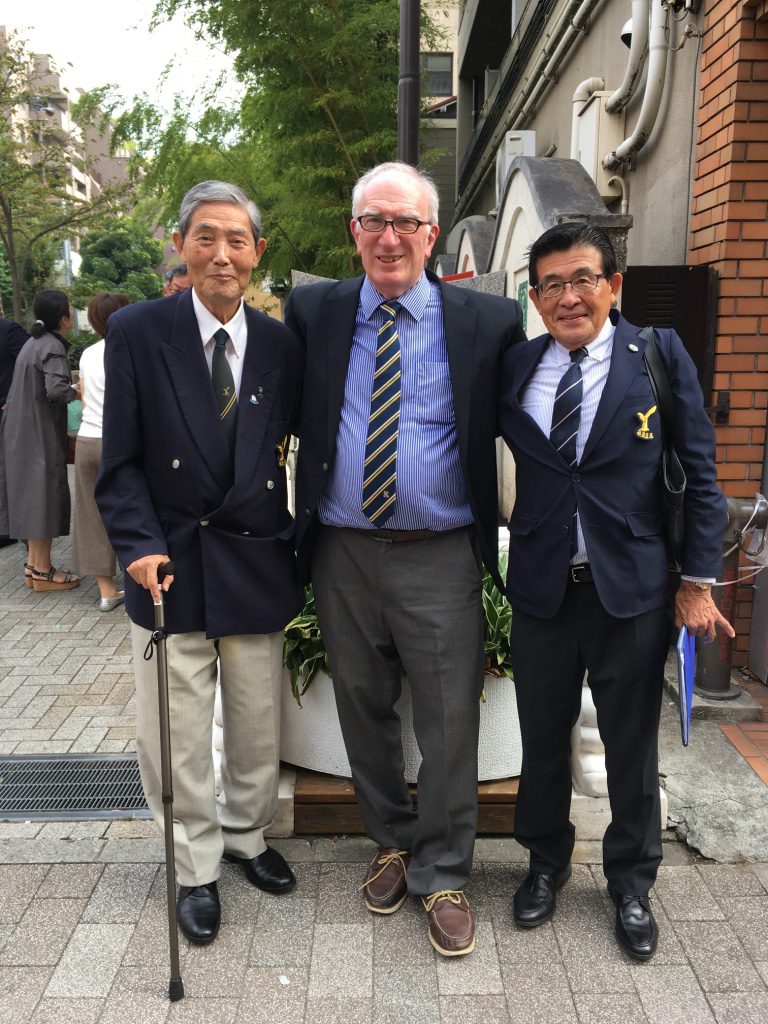I first became really interested in the early history of rugby in Japan when I offered to write a Japan rugby history-related article for the Japan-side commemorative program to be distributed during the Oxbridge Japan rugby tour of 2009. To research the contents I made my first ever visit to the Yokohama Archives of History which has hundreds of thousands of pages of newspapers published in Yokohama in the 19th century and early 20th centuries. There I happened across the news article and editorial comments relating to the founding of Yokohama Foot Ball Club on January 26 1866.
This discovery and the articles publication in the Oxbridge tour program started a chain of events that changed my life and culminated in the unveiling by the chairman of the Japan Rugby Football Union (JRFU) and other local dignitaries on September 6 2019 of an inscribed marble stone at Yamashita-cho 135 in Yokohama’s China Town commemorating the founding of Asia’s first rugby club nearby and the birth of Japan’s rugby history in Yokohama.
However, that article nearly didn’t get published. I think I can say that it wouldn’t have been published but for the support of one man: Yukio Saito, the chairman of the Kanagawa Rugby Football Union (KRFU) in the early 2000s. I had first talked to Saito-san after he made a speech at the reception KRFU held for the touring Edinburgh University team in 2008. He had said that rugby in Japan had started at Keio University so I introduced myself and informed him that Yokohama and Kanagawa Prefecture were where rugby started.
In 2009 the KRFU stepped up to act as the guarantor of the Oxbridge Rugby Tour to Japan that I and several Old Boys of Keio, Waseda, and Meiji university rugby teams had tried to organize by ourselves with the help of Reg Clarke of Rhino Rugby in the UK. The JRFU demanded we have a guarantor for the tour and weren’t prepared to do it themselves. We were lucky when the KRFU kindly agreed to become the guarantor. A committee was formed that included officials of the KRFU and the detailed planning started with meetings in the small KRFU office in Tsurumi which is near Kawasaki.
Dedicated rugby guys are always vulnerable to the ruthless pushing of professional ad company sales executives and ex- professional ad company sales executives who seek to maximize their margins when supplying their services even to supposed friends and there was one on our committee aiming to make his fortune. He was an ex-rugby player who was in the process of retiring from being an account executive at Hakuhodo Inc., Japan’s second biggest advertizing company.
His technique was to be the first to make quotations and then push the committee as quickly as possible to OK each item by using the expression which rough translates into English as ‘OK. It’s decided, isn’t it?’ The rest of our committee had very little or no experience of making quotations but I had a little and when he proposed that the best deal he could find on return air-fares from London was around 220,000 yen per head, remembering that I normally paid less than half that amount, I got a price from Virgin Atlantic that was roughly half his price. When he tried his ‘OK. It’s decided, isn’t it?’ tactic, I responded with ‘Hang on a minute. This is crazy!’ In the end I prevailed so I wasn’t on good terms with him thereafter.
Regarding the article for the tour program for which the soon to be ex-Hakuhodo man had already grabbed the layout and printing contract, I had announced I would write an article for the program but attempts to find out the final deadline for delivery were fudged by this man. When I delivered the article well in advance of printing, our man insisted that I was too late – my article of 6–7 pages would, of course, increase the printing cost and cut his margin.
There was a big argument, and it was Saito-san who led the support for me and insisted the article be included. In fact, on reading the article, he made an even more dramatic decision: he determined that the school children of Kanagawa Prefecture should read the history and ordered a reprint of the program before Oxbridge’s second and final game and arranged for a Japanese translation of the article to be included so that the pupils of every school in the prefecture could easily read it.

Saito-san is a hero!
1 thought on “My research about YFBC was nearly not published”
Comments are closed.